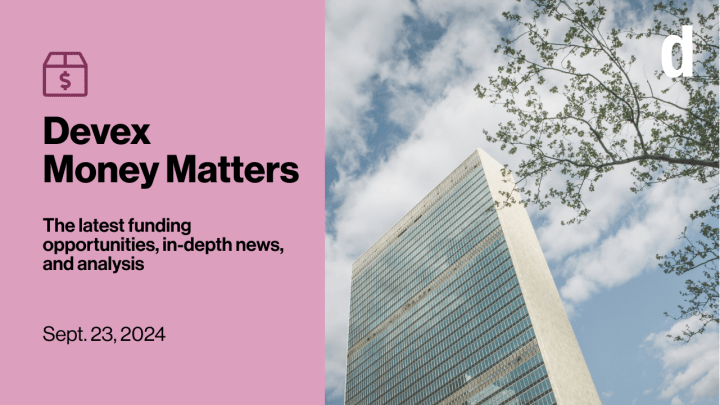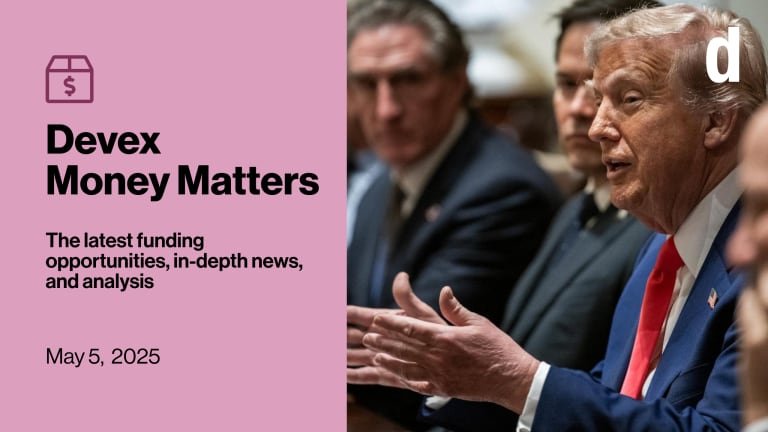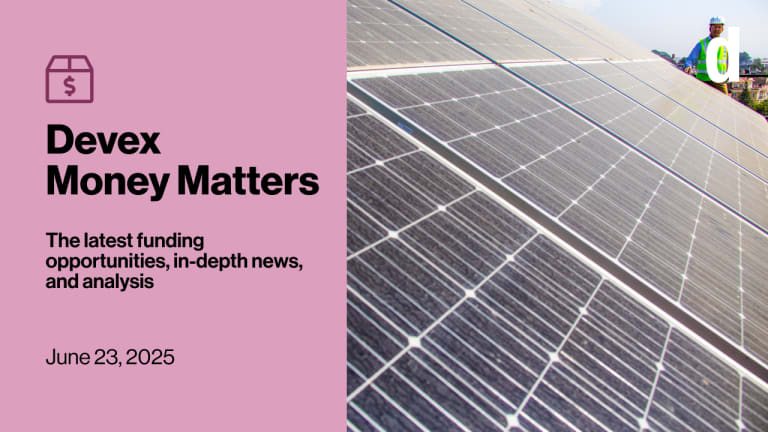
This week, thousands are landing in New York to attend the Olympics of global development: the United Nations General Assembly, or UNGA. As presidents, activists, and diplomats crowd Manhattan, we’ll be on the ground to guide you through the chaos — while keeping a close eye on the decisions affecting funding, investment, and power across the sector. And to help you understand the funding landscape right now, we’ve got a guide on the current state of funding at U.N. agencies.
Also in this edition: The “woeful” state of climate finance, an inside look at UNICEF’s Child Nutrition Fund, and a big win for Malawi, Tanzania, and Zambia
+ Are there topics you want to read more about in Money Matters? We want your feedback.
On the lookout
This is a preview of Devex Money Matters
Sign up to this weekly newsletter and get the latest in development funding in your inbox every Monday.
The United Nations is one of the most important institutions — if not the most important — in international development. And it’s growing fast. In 2022, it had a budget of $74.3 billion — up 12.8%, in cash terms, from 2021. Individual agencies like the World Food Programme and UNICEF spend more than $10 billion a year.
One of the main decision-making bodies of the U.N. — involved in setting the priorities for all of those organizations — is the General Assembly, which meets from mid-September until December. This week sees the high-level meetings, attended by leaders from around the world.
To provide you with a guide to UNGA, we’ve broken down the revenue and spending of all the major agencies.
Furthermore, there are several UNGA attendees we’re looking out for this week, including those who — at least to some extent — hold the purse strings of development’s biggest players.
USAID Administrator Samantha Power, for example, will be launching new commitments in the democracy and health sectors (check in with us later today and on Wednesday to learn more); Brazilian President Luiz Inácio Lula da Silva, for another, is expected to make the case for reforming the international finance system, and pushing a proposal for a 2% tax on the world’s billionaires.
Leading philanthropists, political leaders, and corporation heads will also have the stage, so listen in to what they have to say by exploring our event calendar below.
Read: Inside the finances of the United Nations (Pro)
Also read: Who's who at the UN Future Summit and UNGA 79
ICYMI: Your UNGA 79 event guide
On Sept. 25-26, Devex will be hosting The future can’t wait: Shaping tomorrow, today — a series of panel discussions, brainstorming, insider conversations, and interviews with global development luminaries on the sidelines of UNGA in New York. Register now to be a part of this free event.
Funding activity
We publish tenders, grants, and other funding announcements on our Funding Platform. Here are some of the ones which have been viewed the most in the past 10 days.
CAF, the Latin American and Caribbean development bank, has approved a $25 million investment to support infrastructure projects in Brazil.
The European Bank for Reconstruction and Development has announced a €50 million ($55.7 million) project that will help boost lending for micro-, small, and medium-sized enterprises in Egypt.
The European Union has released $2.2 million ($2.4 million) in humanitarian aid to support victims of Typhoon Yagi in Southeast Asia.
The U.K. Foreign, Commonwealth & Development Office has launched a £200,000 ($266,277) grant to assess the feasibility of innovative finance mechanisms in Ukraine.
Global Affairs Canada has announced a CA$120 million ($88.4 million) loan to support Ukrainian refugees in Moldova.
The Green Climate Fund has invited national firms to provide their expertise for a climate and health feasibility study in Madagascar.
+ Try out Devex Pro Funding today with a free five-day trial and explore funding opportunities from over 850 sources in addition to our analysis and news content.
Glass half full?
Woefully short, woefully slow, and woefully inadequate. That’s how Naveen Rao — the senior vice president for health at the Rockefeller Foundation — describes the world’s response to climate change, especially when it comes to raising the money needed to curb its impacts.
“Walking the talk is all about a serious commitment to help countries with their adaptation plans, specifically on health. And I want to see the dollar number. I want to see it increase,” Rao told my colleague Jenny Lei Ravelo, days before UNGA began.
Nearly a year ago, donors committed $1 billion for climate and health at the 28th U.N. Climate Change Conference in Dubai, including $100 million from the Rockefeller Foundation. During last year’s UNGA, Rao’s organization had also pledged $1 billion to advance climate solutions.
Despite that, funding is nowhere near the amount that’s needed — especially when health comes into account. According to the U.N. Environment Programme, countries will need an estimated $11 billion a year to deal with increases in malaria, dengue, diarrheal diseases, and heat-related mortality, as well as to make resilient health infrastructure in the face of climate change, Jenny writes.
Even so, Rao remains hopeful.
“[The] protocols, the traffic jams, the show. More of that happens than I wish would. Less of what I want happens, happens,” Rao told Jenny. “But it does happen.”
Read: Climate finance for health — ‘Woefully short, woefully slow’ (Pro)
An $80M boost
In Washington, D.C. money does seem to be flowing: Last week, the U.S. announced it was doubling down on its flagship hunger initiative in Malawi, Tanzania, and Zambia — the result of a Feed the Future accelerator program that will provide targeted investments to nations with high need and high potential.
With an $80 million investment, USAID and the State Department hope to spare 550,000 people from chronic hunger across the region. Those efforts will also be complemented by $150 million in private sector funding, with companies investing in the countries’ coffee, seed, and sweet potato supply chains, among other projects.
USAID’s Power says that her agency was making “a big bet” on areas where dollars were going the furthest, which could amplify the investment many times over.
“Together we will create an engine that can help feed hungry people, not just in these three countries, but across the African continent,” she says.
Read: US Feed the Future ramps up investments in Malawi, Tanzania, Zambia
Strategically late
Meanwhile, the White House has released a global development strategy. Usually, that would be big news, but it’s of rather less value because there are only six weeks left before we have a new president, who will presumably want to set their own strategy. Commentators say that it was for the most part a plea for unity and continuity.
Read: White House releases long-planned global development strategy (Pro)
+ Your Devex Pro membership gives you access to all our exclusive reporting and analysis on the U.S. development sector. Not yet a Pro member? Access all our exclusive reporting and analyses, data-driven funding insights, career resources, and more by starting your 15-day free trial today.
(Nutrient) rich
For more good news, look toward UNICEF, which is moving full steam ahead on its Child Nutrition Fund.
Since 2022, the financing mechanism has coordinated global donors to target investments more efficiently, partnering with governments, local organizations, and others to get resources where they’re needed most. Inspired by the Global Fund to Fight AIDS, Tuberculosis and Malaria, it’s supported by multibillion philanthropies the Children’s Investment Fund Foundation and Gates Foundation, as well as the U.K. donor agency FCDO. It serves as both a pot of money and a coordinating platform to address child malnutrition.
Still, the fund has a long way to go. UNICEF hopes to raise $2 billion for the fund by 2030 — and two years into its existence, it’s galvanized $270 million.
Read: What is the Child Nutrition Fund? (Pro)
Feel the pain
A new approach to development funding is uncomfortable — but necessary.
That’s according to Melody Song, the head of philanthropy with EIT Climate-KIC, which focuses on innovative climate solutions through systems change.
“Today, as we all feel the need to accelerate climate action, it’s time to learn from the past few years and address the systemic issues with these models and move toward innovative approaches like learning-based funding that aim to redefine relationships between funders and communities,” Song writes in an opinion piece for Devex.
Opinion: A new approach to development funding is uncomfortable but needed
Sign up to Money Matters for an inside look at the biggest stories in development funding.




